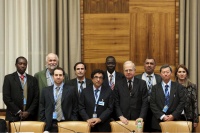Home » Tunisia » TUN - News » Tunisia: On the Increasing Practice of Secret Detention in the Context of the Fight Against Terrorism
In its submission, Alkarama focused on the systematic and continuing practice of incommunicado detention of persons suspected or accused of terrorism, a growing practice in Tunisia where, under the pretence of fighting terrorism, Tunisian security services arrest and detain suspects for long periods of time outside the protection of the law, in violation not only of international law, that sees this practice as comparable to that of enforced disappearance, but also in violation of the Tunisian Constitution and the Code of Criminal Procedure.
Victims are thus arrested without judicial warrant, sometimes at night, imprisoned in one of the detention centres manned by the forces responsible for terrorism and are denied any contact with the outside world for six days, during which the family completely ignores the fate of the victim. Many cases documented by Alkarama and other human rights organisations demonstrate the systematic nature of this practice, which itself leads to other violations such as torture and other cruel and inhuman treatment. Such has been the fate of Hanene Chaouch, a young volunteer campaigning for orphans, arrested without a warrant and held incommunicado for six days where she was tortured and submitted to ill-treatment, not allowed to see a lawyer, or to inform her family of her place of detention.
Moreover, Alkarama notes that, four years after the ratification of the ICPPED, Tunisian law still does not criminalise enforced disappearance, although Article 4 of the Convention states that the State Party is required to take "the necessary measures to ensure that enforced disappearance constitutes an offence under its criminal law." Still not having criminalised enforced disappearance, however, Tunisia states in its report to the Committee that article 250 of the Criminal Code may partly cover the constituent elements of the crime of enforced disappearance, because this provision punishes a public official if he "captures, arrests, holds a person in detention or in sequestration" without a court order. In this regard, Alkarama suggests that the CED request the State party whether this provision also applies to the fight against terrorism forces, and to "provide specific information on cases in which charges were brought against members of security forces who have made an arrest and illegal detention."
With regard to the requirement provided for by ICPPED Art. 3 to investigate and report cases of disappearances, the State party indicated that it had established the Truth and Dignity Forum, a government body set up by the organic Law No. 2013-53 of 24 December 2014 in order to investigate cases of enforced disappearance and to monitor places of detention in order to prevent such crimes from being committed. In this regard, Alkarama suggested that the State party "indicate whether the instance also has free access to detention centres under the control of forces fighting against terrorism – such as Gorjani and Kasserine detention centres."
Alkarama also notes with concern the persistence with which Tunisia violates the provisions of Art. 18 of the Convention which guarantees the family of an arrested person to know the fate of their relative, their place of detention and the identity of the forces holding him. Also as part of the fight against terrorism, these rights are not granted to the family, and are denied any information about him and often any recognition of his detention.
Finally, Alkarama concludes its report to the Committee by suggesting Tunisia to provide elements of information on any measures taken to prevent violations of the International Convention for the Protection of All Persons against Enforced Disappearance (ICPPED) such as incommunicado detention – including the training of the security forces – and also to clarify the applicability of the Convention's guarantees to terrorism suspects.
The list of issues will be adopted by the Committee on Enforced Disappearances (CED) at its 9th session in September 2015, in order to engage in a constructive dialogue with Tunisia, who will be required to provide written responses to the list questions before its review, scheduled for early 2016.
For more information or an interview, please contact the media team at This email address is being protected from spambots. You need JavaScript enabled to view it. (Dir: +41 22 734 1008).
 Algeria
Algeria Bahrain
Bahrain Djibouti
Djibouti Egypt
Egypt Iraq
Iraq Palestine/Israel
Palestine/Israel Jordan
Jordan Kuwait
Kuwait Lebanon
Lebanon Libya
Libya Mauritania
Mauritania Morocco
Morocco Oman
Oman Qatar
Qatar Saudi Arabia
Saudi Arabia Sudan
Sudan Syria
Syria Tunisia
Tunisia United Arab Emirates
United Arab Emirates Yemen
Yemen Other Countries
Other Countries






